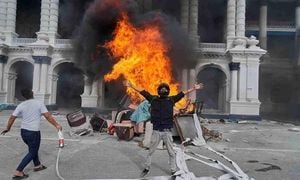California and Texas, the two most populous states in the U.S., are now at the epicenter of a high-stakes political battle that could reshape the nation’s balance of power. On August 21, 2025, California Governor Gavin Newsom signed into law two redistricting bills passed by the state’s Democratic-controlled Legislature. These measures, as reported by Axios, were a direct response to Texas' Republican-majority House passing a new congressional map that would add five seats favoring Republicans—an effort encouraged by former President Donald Trump.
“This is not something six weeks ago that I ever imagined that I’d be doing,” Newsom remarked before putting pen to paper. “We’re responding to what occurred in Texas,” he continued, emphasizing the intent to “neutralize what occurred, and [give] the American people a fair chance, because when all things are equal, we’re all playing by the same rules.”
The stakes? Nothing less than control of the U.S. House of Representatives. As BBC News explains, the House currently rests on a knife’s edge, with Democrats needing just three more seats to flip the chamber. With the 2026 midterms looming, both parties are scrambling to redraw congressional maps in their favor, hoping to capture or defend the majority. The political arms race between California and Texas could tip the scales nationally—and it’s already inspiring similar maneuvers in states like Illinois, New York, Indiana, and Florida.
But how did this all begin? The battle was set in motion earlier this summer when Texas’ Republican-controlled legislature took the unusual step of redrawing congressional districts mid-decade. Their goal: to add five new seats that would likely send more Republicans to Washington. The effort was so contentious that Texas Democrats fled the state in early August, hoping to deny the quorum needed to pass the measure. After two weeks—and under the threat of arrest by order of Governor Greg Abbott—they returned, and the bill passed the House by an 88-52 vote. The state Senate quickly endorsed the measure, and Abbott is expected to sign it into law.
California’s response was swift and pointed. Lawmakers voted to redraw their own districts to boost Democratic representation by five seats, aiming to cancel out the Texas move. “We’re fighting fire with fire,” Newsom declared, echoing the combative rhetoric that has come to define this new era of redistricting brinkmanship. Yet, as BBC News notes, California’s path is complicated by a 2008 law designed to make redistricting less partisan, requiring that any new maps be put to a public vote. So, on November 4, 2025, Californians will head to the polls in a special election to decide whether to temporarily suspend the map drawn by the state’s independent commission in favor of the Legislature’s new proposal.
The cost of this political chess match is staggering. According to the California Assembly Appropriations Committee, the special election will cost approximately $230 million. This has drawn sharp criticism—especially given that just four years ago, Newsom and his allies lambasted the $276 million recall vote against him as a wasteful partisan stunt. “Here’s the worst part: Their partisan recall will waste 200 million taxpayer dollars desperately needed for emergency preparedness and response,” Newsom said in an official response to the recall effort. He doubled down in a March 2025 press conference, calling the recall “nothing more than a partisan power grab. This is, and forgive me, a Republican-backed recall.”
Other California Democrats who now back the redistricting special election were equally critical of the recall’s expense at the time. Assembly member Marc Berman expressed frustration, saying, “Californians are very frustrated that we just spent $276 million on this recall election that, from the looks of it, certified what voters said three years ago and what voters could have said next year,” as reported by CalMatters. Representative Kevin Mullin once called the recall “a $276 million waste just to reaffirm 2018’s results with an election coming in 2022,” according to CNN. Yet, both now support the redistricting vote, with Berman recently remarking, “$250 million looks like couch cushion change,” and Mullin stating that Democrats are “committed to giving voters the opportunity to counter this move in Texas and restore some balance of power in Washington.”
Unsurprisingly, critics have seized on the apparent contradiction. Jessica Millan Patterson, chair of the conservative group Stop Sacramento’s Power Grab, told Fox News Digital, “Gavin Newsom and California Democrats have abandoned any pretense of moral high ground by forcing a wasteful special election that voters don’t want. Their blatant hypocrisy at the expense of California taxpayers sends a clear message: grasping for power matters more to them than honest, principled governing.”
Newsom, for his part, is undeterred by the criticism. When pressed about the cost, he responded, “There’s no price tag for democracy,” assuring county officials that the state would cover the expense of the special election.
Beyond California and Texas, the redistricting scramble is spreading. BBC News reports that Democratic-led states such as Illinois, New York, New Jersey, New Hampshire, and Maryland are preparing countermeasures to Texas’ plan, while Republican-leaning states like Indiana, Florida, Missouri, and Ohio are also weighing redistricting efforts to boost GOP representation. Even smaller states, usually irrelevant in these battles, may be drawn in as the stakes rise.
At the heart of the debate is the practice of gerrymandering—the manipulation of electoral boundaries to favor one party. While both Democrats and Republicans have engaged in gerrymandering, rarely have lawmakers so openly acknowledged their partisan intentions as they have this year. Critics argue that the process allows politicians to pick their voters, rather than the other way around. The Supreme Court, in a 2019 decision, removed federal courts from policing partisan gerrymanders, with Chief Justice John Roberts writing, “Federal judges have no license to reallocate political power between the two major political parties.”
Some civil rights groups and Democrats have threatened to sue over Texas’ new maps, arguing they dilute minority voting power in violation of the federal Voting Rights Act. In California, the decision to bypass the independent commission—deeply favored by voters, according to Politico—may also spark legal and political backlash.
The broader context is a nation increasingly polarized, where even the mechanisms of democracy are battlegrounds for partisan advantage. As New York Governor Kathy Hochul put it, “In New York, we’ll confront Trump’s legal insurrection head-on. We’ll meet him on the same field and beat him at his own game.”
As the November 4 special election approaches, Californians—and the nation—will be watching closely. The outcome could reverberate far beyond state lines, shaping the composition of Congress and the trajectory of American politics for years to come. The fight over redistricting is no longer just about maps; it’s about who holds the reins of power in a deeply divided country.






